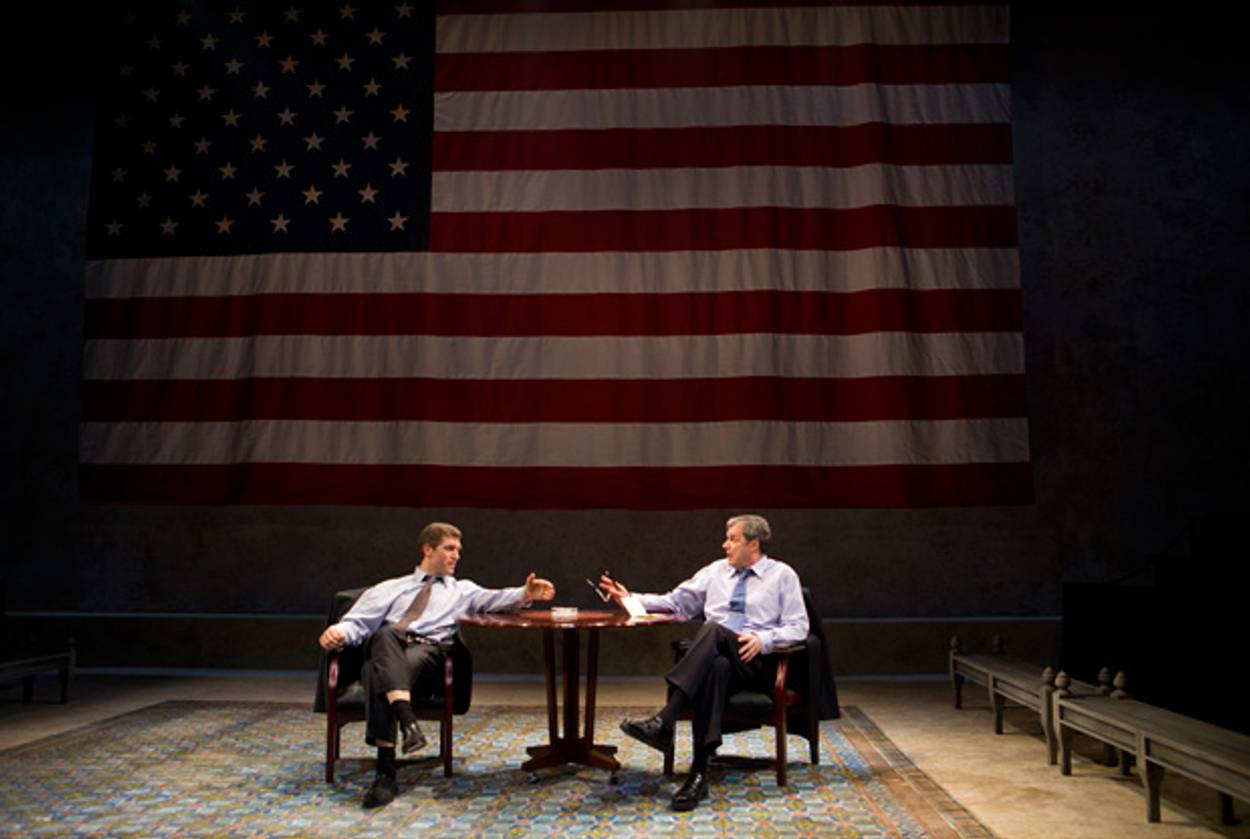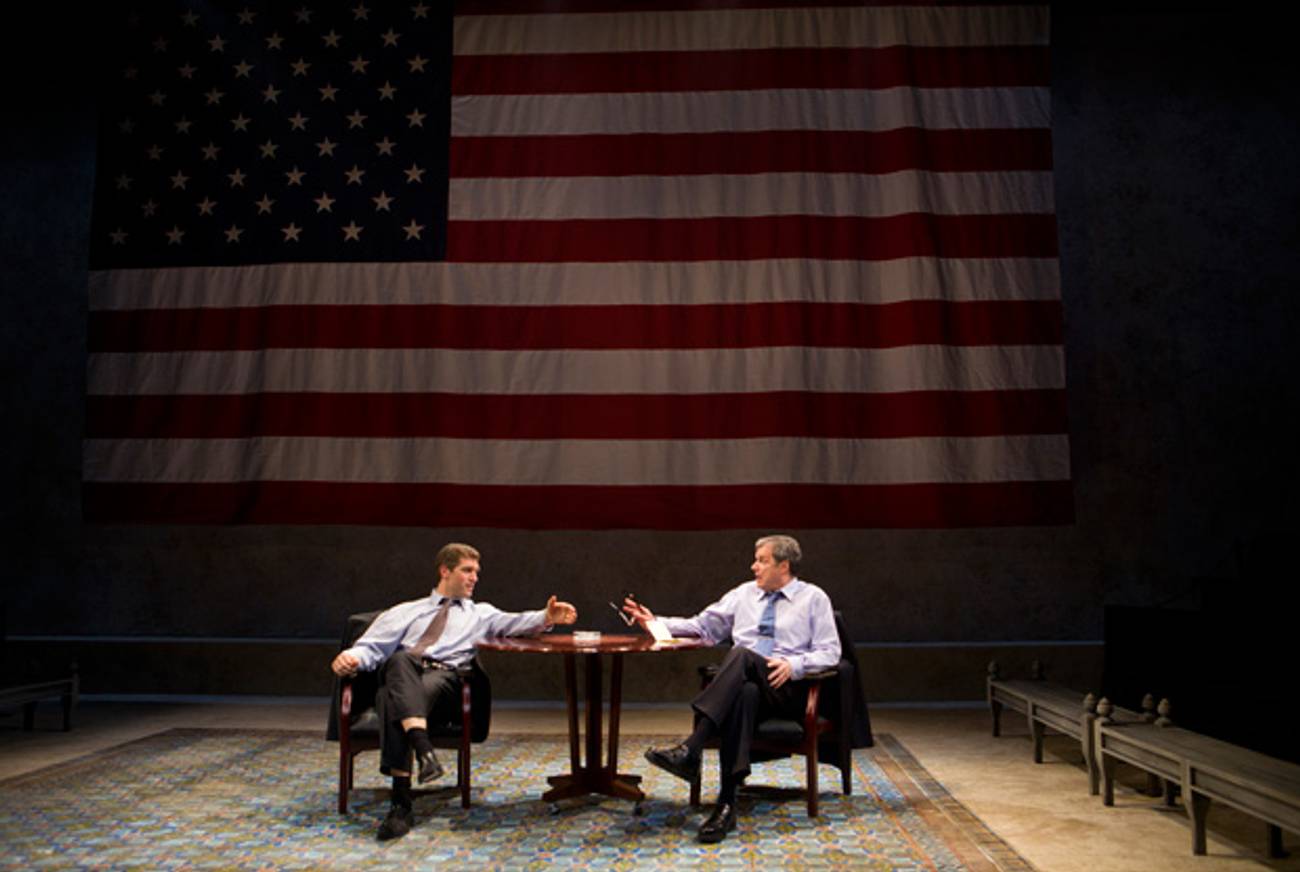Hearts and Minds
A pair of new plays—one powerful, about Afghanistan; the other less successful, about Eichmann—bring recent history to the stage




Two plays—Blood and Gifts, a drama about the origins of America’s war in Afghanistan, now at Lincoln Center’s Mitzi Newhouse Theater, and Captors, which examines the kidnapping of Adolf Eichmann and which ran at the Huntington Theatre Company in Boston through last weekend—demonstrate the power and hazards of bringing recent history to the stage.
Playwright J.T. Rogers, the young author of Blood and Gifts, is obsessed with history. This is his third historical play—all of which have been critically if not commercially successful. And you don’t have to be an Afghan expert—or even deeply pro- or anti-America’s war in a land where “wartorn” is a gross understatement—to enjoy Rogers’ original, compelling play. But those who have followed the war closely will get more of his grim jokes and more easily track the play’s cast of warlords and their ever-shifting alliances.
This is a complex, politically subtle play without a simple message. It succeeds because it raises the most profound questions about how men of such good intentions—and all the major characters are male—could have gotten things so terribly wrong while seeming to get them right. Americans helped the Soviets in the decade the play examines, 1979 to 1989, when the spy services of the United States, Britain, and Russia were replaying the “Great Game,” the centuries-long power struggle in this historic crossroads. But the victory soon turns sour, as civil war erupts among the Western-armed Afghan war lords, after which the Pakistani-supported Taliban usher in yet more barbarous intolerance.
At a discussion with members of the Council on Foreign Relations after a performance last week, Bartlett Sher, whose disciplined, crisp direction maximizes the play’s emotional punch, said he believes that a dramatist’s role is not to preach for or against U.S. involvement in this 8-year-old war but to prompt an audience to “pose the question.”
Blood and Gifts makes you wonder how Americans failed to see that helping the Afghans expel the Soviets would strengthen the militant Islamists who would then target Americans once the Russians were gone. After the Islamic revolution in Iran, why did Washington not see that stoking religious fervor for short-term gain would end badly? Why did the United States let Pakistan decide which war lords to bless with U.S. “gifts”—increasingly sophisticated weapons that would soon be aimed at Afghans of other tribes, ethnicity, and religious beliefs and then at Americans? Why did the CIA think it had no further obligation to the Afghan people once the Russians were ousted?
But the play’s fictional characters raise questions beyond politics, among them, how could men who have worked so closely together for so long understand one another so little?
The play opens in 1979 with the arrival in Islamabad of the absolutely American James Warnock, a CIA veteran of Iran, whose mission is to arrange an alliance with Col. Afridi of Pakistan’s Inter-Services Intelligence, or ISI, the Pakistan Army’s notoriously treacherous intelligence arm. The idea is to supply U.S. money and arms to anti-Soviet Afghans without American fingerprints. But what Warnock calls “deniability, first and foremost” gives Pakistan a dangerous upper hand in the relationship. Simon Craig, Warnock’s British counterpart, a regionally savvy, whiskey-swilling junior partner in this mission, warns Warnock that Afridi’s determination to channel the weapons to Gulbuddin Hekmatyar—the Islamist fanatic who is now targeting American forces in Afghanistan—will backfire, given his penchant for wanton and savage treatment of Afghans who oppose his fanatical interpretation of Islam. As insurance, Warnock opens his own secret channel to the more secular Abdullah Khan, a warlord who appears to become not merely an ally of convenience but Warnock’s friend.
Rogers’ characters learn painful lessons in Afghanistan, Pakistan, and Washington, the play’s three venues. Warnock comes to understand how hard it is to know men of another culture. Simon, his MI6 counterpart, learns that Americans can be just as devious and cynical as their Pakistani and Afghan allies. Afghans, as Simon tries warning his American partner, are “charming, semi-civilized and utterly untrustworthy”—“French, without the food.” And all the characters learn that even close friends and allies are rarely what they seem. “Secrets,” Simon says ruefully, “they do … corrode,” along with trust.
Simon turns out to be Jewish, a fact he does not advertise given the region’s prejudices and politics, but of which the insidiously anti-Semitic Afridi repeatedly reminds him.
Rogers’ play provides plenty of heartbreak, personal and political. His key characters all end up with some sorrow, professional as well as personal. Perhaps because, as Rogers observes, Russians seem to excel at suffering, and perhaps because the Western “victory” over the Soviets is the occasion for the Afghan sideshow destined to go terribly awry, Rogers has given a truth-telling role to Dmitri Gromov, a Soviet not-so-secret agent who strikes up a friendship of convenience with Warnock, whom he is charged with watching.
The cast is as sharp as the play’s dialogue. The gifted Jeremy Davidson plays Warnock perfectly—his controlled but confident gait and steely reserve mask to all but the closest of friends the pain of an earlier failure and professional uncertainty. Jefferson Mays is unforgettable as Simon, whose piercing irony about Middle Eastern and Whitehall politics gives the play humor and depth. Michael Aronov plays Gromov, whose Russian humor, as he confesses to Warnock, takes the form not of “ha-ha” jokes but of the Slavic “let me put a stick in your eye because life is not worth living” variety. Gabriel Ruiz is utterly believable as the slimy, corrupt Islamist sympathizing Col. Afridi. And Bernard White as Afghan warlord Abdullah Khan has a twinkle in his eye and an elegance about him that is destined to break one’s heart. John Procaccino, as Walter Barnes, Warnock’s CIA colleague, must have spent weeks at Langley learning how to impersonate an agency bureaucrat flawlessly, and Robert Hogan, as Sen. Jefferson Birch, gives another sterling smaller performance as the passionate southern senator who despite his vapid political platitudes is nobody’s fool. Special tribute must also be paid to Deborah Hecht, the play’s dialect coach, for her versatility in several languages.
Such a coach would have been of value to the cast of another historical drama—Captors, which closed over the weekend after a limited run. But the cast’s struggle with Israeli and German accents was only one of this potentially powerful play’s problems.
Evan M. Wiener’s play is an account of the 10 days that a team of young Mossad and Shin Bet agents spent with Adolf Eichmann in a safe house in the 1960s after his capture in Buenos Aires and before he was smuggled out of Argentina to stand trial in Israel.
Based on the 1990 memoir Eichmann in My Hands, by Peter Z. Malkin, the former agent who died in 2005, Captors explores three sets of relationships: one between Eichmann and his captors, especially Malkin; another concerning the tensions and rivalries within the Israeli team; and finally, the antagonism between team member Malkin and his memoirist, a relentless young writer named Cohn who challenges Malkin’s account of what happened inside the safe house during those 10 days.
But the three narratives interconnect awkwardly. This is particularly true of Wiener’s focus on Malkin’s memory. Thirty years after the Israeli gag order on the kidnapping was lifted, Malkin, portrayed by Louis Cancelmi, is finally able to recount his role in this early Israeli version of a modern-day American “rendition.” But is his account accurate, asks writer/collaborator Cohn, played by Daniel Eric Gold. Does accuracy about such minor details matter, Malkin shoots back. Yes, Cohn responds, because Eichmann’s own trial testimony was full of “lies and misdirections,” distortions and self-serving reinterpretations. So, Malkin’s book must be accurate, the writer insists.
The importance of memory is almost a play unto itself. Artfully tackled, the theme could have reinforced the dramatic tension in both the duels between Malkin and Eichmann and the rivalries among the Israeli team members. But when such a potentially powerful idea simply pops up, particularly after an intense confrontation between Eichmann and Malkin, it diminishes the power of the clash. That is a pity, for there is much to admire in Wiener’s thoughtful account of this riveting Israeli exploit.
The captors are a young, dedicated, inexperienced, and motley crew, virtually all of whom have lost family in the Holocaust. This gives their mission purpose, as does their determination to treat their captive as humanely as circumstances allow. The temptation to seek immediate vengeance on the architect of the Final Solution is powerful, and Malkin is not immune. He flirts more than once with killing Eichmann. Why risk spiriting him out of Argentina, a country literally “crawling” with ex-Nazi fugitives, to stand trial in Israel?
But Uzi, played by Ariel Shafir, convincingly argues that the death of an anonymous man at the hands of anonymous men would be buried in the press “under the latest on Sputnik.” When even some Israelis were reluctant to discuss the slaughter of Europe’s mostly passive Jews, the team sensed that a trial would be crucial for Israel and for Jews throughout the world.
Eichmann himself is problematic. Michael Cristofer’s Eichmann seems a nice fellow. The playwright has said that his intent was to “humanize” Eichmann as a character, to rescue him from being the iconic bureaucratic villain of Hannah Arendt’s “banality of evil.” But it’s hard to imagine Wiener’s Eichmann committing the atrocities described in the testimony at his trial in Israel. Wiener’s Eichmann worries tenderly about his “innocent” wife and children, who will not know where he has gone or what has become of him. His Strauss-loving, violin-playing Eichmann is perhaps too nice, which undermines Malkin’s ultimate triumph over him.
There is also a whiff of moral equivalency in Wiener’s characters. Yes, Malkin heatedly denies Eichmann’s assertion that both of them are alike because they are both “soldiers” bound by their sense of “duty” and “tied to our goals.” “There’s no difference,” Eichmann asserts. Malkin angrily disagrees: He and Eichmann are not alike. For one thing, Malkin says, he has disregarded his superior’s order not to “engage” him, seemingly a fairly inconsequential difference between them. Malkin also asserts that his team’s operation in Argentina differs from what Eichmann did because “the reasons are different, in every way.” While motive matters, the contrast between a team of Mossad agents violating Argentina’s laws to bring a Nazi war criminal to justice and Eichmann’s role in murdering Europe’s Jews should have been starkly drawn. The play dramatizes Eichmann’s kidnapping; Eichmann’s crimes against humanity remain off-stage.
Judith Miller, Tablet Magazine’s theater critic, is the author of the memoir The Story: A Reporter’s Journey.
Judith Miller, Tablet Magazine’s theater critic, is a former New York Times Cairo bureau chief and investigative reporter. She is also the author of the memoir The Story: A Reporter’s Journey.